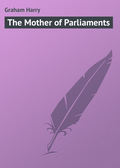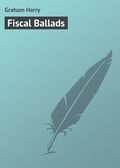
Graham Harry
Misrepresentative Women
Dame Rumor
I should like to remark that Dame Rumor
Is the most unalluring of jades.
She has little or no sense of humor,
And her fables are worse than George Ade’s.
(Or rather, I mean, if the reader prefers,
That the fables of Ade are much better than hers!)
Her appearance imbues one with loathing,
From her jaundiced, malevolent eyes
To the tinsel she cares to call clothing,
Which is merely a patchwork of lies.
For her garments are such that a child could see through,
And her blouse (need I add?) is the famed Peek-a-boo!
She is wholly devoid of discretion,
She is utterly wanting in tact,
She’s a gossip by trade and profession,
And she much prefers fiction to fact.
She is seldom veracious, and always unkind,
And she moves to and fro with the speed of the wind.
She resembles the men who (’tis fabled)
Tumble into the Packingtown vats,
Who are boiled there, and bottled, and labelled
For the tables of true democrats:
Pickled souls who are canned for the public to buy,
And (like her) have a finger in every pie!
With a step that is silent and stealthy,
Or an earsplitting clamor and noise,
She disturbs the repose of the wealthy,
Or the peace which the pauper enjoys.
And, however securely the doors may be shut,
She can always gain access to palace or hut.
Where the spinsters at tea are collected,
Her arrival is hailed with delight;
She is welcomed, adored, and respected
In each newspaper office at night;
For her presence imprints an original seal
On an otherwise commonplace journal or meal.
She has nothing in common with Virtue,
And with Truth she was never allied;
If she hasn’t yet managed to hurt you,
It can’t be from not having tried!
For the poison of adders is under her tongue,
And you’re lucky indeed, if you’ve never been stung.
Are you statesman, or author, or artist,
With a perfectly blameless career?
Are your talents and wits of the smartest,
And your conscience abnormally clear?
“He’s a saint!” says Dame Rumor, and smiles like the Sphinx.
“He’s a hero!” (She adds:) “What a pity he drinks!”
Gentle Reader, keep clear of her clutches!
O beware of her voice, I entreat!
Be you journalist, dowager duchess,
Or just merely the Man in the Street.
And I beg of you not to encourage a jade
Who, if once she is started, can never be stayed.
The Cry of the Children
[On the subject of infant education it has been suggested that more advantageous results might be obtained if, instead of filling children’s minds with such nonsense as fairy-tales, stories were read to them about Julius Cæsar.]
O my Brothers, do you hear the children weeping?
Do you note the teardrops tumbling from their eyes?
To the school-house they reluctantly are creeping,
Discontented with the teaching it supplies.
At the quality of modern education
Little urchins may with justice look askance,
Since it panders to a child’s imagination,
And encourages romance.
Do you see that toddling baby with a bib on,
How his eyes with silent misery are dim?
He is yearning for the chance of reading Gibbon;
But his teachers give him nothing else but Grimm!
What a handicap to infantile ambition!
’Tis enough to make the brightest bantling fume,
To be gammoned with an Andrew Lang edition,
When he longs for Hume, sweet Hume!
See that tiny one, what boredom he expresses!
What intolerance his frequent yawns evince
Of the fairy-tales where beautiful princesses
Are delivered from a dragon by a prince!
How he curses the pedantic institution
Where he can’t obtain such volumes as “Le Cid,”
Or that masterpiece on “Social Evolution”
By another kind of Kidd!
Do you hear the children weeping, O my Brothers?
They are crying for Max Müller and Carlyle.
Tho’ Hans Andersen may satisfy their mothers,
They are weary of so immature a style.
And their time is far too brief to be expended
On such nonsense as their “rude forefathers” read;
For they know the days of sentiment are ended,
And that Chivalry is dead!
Oh remember that the pillars of the nation
Are the children that we discipline to-day;
That to give them a becoming education
You must rear them in a reasonable way!
Let us guard them from the glamour of the mystics,
Who would throw a ray of sunshine on their lives!
Let us feed each helpless atom on statistics,
And pray Heaven he survives!
Let us cast away the out-of-date traditions,
Which our poets and romanticists have sung!
Let us sacrifice the senseless superstitions
That illuminate the fancies of the young!
If we limit our instruction to the “reals,”
We may prove to ev’ry baby from the start,
The futility of cherishing ideals
In his golden little heart!
The Cry of the Elders
[With steady but increasing pace the world is approaching a point at which the cleverness of the young will amount to a social problem. Already things are getting uncomfortable for persons of age and sobriety, whose notion of happiness is to ruminate a few solid and simple ideas in freedom from disturbance. —Macmillan’s Magazine.]
O my Children, do you hear your elders sighing?
Do you wonder that senility should find
Your encyclopædic knowledge somewhat trying
To the ordinary mind?
In the heyday of a former generation,
Some respect for our intelligence was shown;
And it’s hard for us to cotton
To the fact that you’ve forgotten
More than we have ever known!
O my Children, do you hear your elders snoring,
When the “chassis” of your motors you discuss?
Do you wonder that your “shop” is rather boring
To such simple souls as us?1
Do you marvel that your dreary conversation
Should evoke the yawns that “lie too deep for tears,”
When you lecture to your betters
About “tanks” and “carburettors,”
About “sparking-plugs” and “gears”?
O my Children, in the season of your nonage,
(Which delightful days no longer now exist!)
We could join with other fogeys of our own age
In a quiet game of whist.
Now, at bridge, our very experts are defeated
By some beardless but impertinent young cub,
Who converts our silent table
To a very Tow’r of Babel,
At the Knickerbocker Club!
O my Children, we no longer are respected!
’Tis a fact we older fellows must deplore,
Whose opinions and whose judgments are neglected,
As they never were before.
We may tender good advice to our descendants;
We may offer them our money, if we will;
Lo, the one shall be forsaken,
And the other shall be taken
(Like the women at the mill!).
O my Children, note the moral (like a kernel)
I have hidden in the centre of my song!
Do not contradict a relative maternal,
If she happens to be wrong!
Be indulgent to the author of your being;
Never show him the contempt that you must feel;
Treat him tolerantly, rather,
Since a man who is your father
Can’t be wholly imbecile!
O my Children, we, the older generation,
At whose feet you ought (in theory) to sit,
Are bewildered by your mental penetration,
We are dazzled by your wit!
But we hopefully anticipate a future
When the airship shall replace the motor-’bus,
And your children, when they meet you,
Shall inevitably treat you
Just as you are treating us!
1. “As us” is not grammar. – Publishers’ Reader. “As we” is not verse. – H. G.







